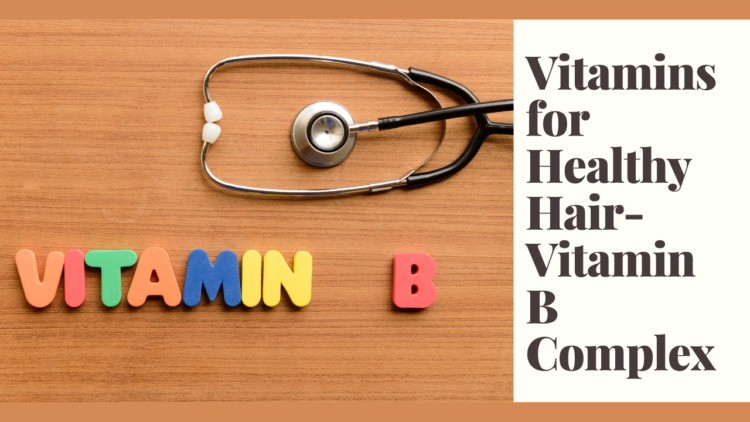B vitamins consist of a group of water soluble vitamins that are essential to your overall health. A common misconception about B vitamins is that they are all one vitamin, commonly referred to as vitamin B. In reality, though, there are many B vitamins including B1, B2, B3 along with vitamins B5, B6, B7, B9 and finally B12. It has been long known that some of the B-complex vitamins can do wonders when it comes to improving hair growth, shine and thickness. Let’s take a better look at how B-complex vitamins can help hair grow better.
Which B Vitamins Promote Hair Growth?
While there are many different B vitamins, each with slightly different health benefits, most hair care experts recommend that if you have a vitamin B deficiency, you should be taking full vitamin B complex supplements (or eating foods that contain all of these vitamins). The reason for this is simple: B vitamins work to support many vital bodily functions and they are better absorbed and produce the best results when taken together.
Below is a list of B-complex vitamins that are commonly used to promote healthy hair.
Vitamin B2 (also known as riboflavin): This vitamin plays a key role in fat, protein and carb metabolism. A riboflavin deficiency can result in severe or gradual hair loss.
Vitamin B5 (also known as pantothenate): This vitamin is commonly found in various skin and hair care products. A pantothenate deficiency can result in hair loss and scalp irritation. Some hair care experts believe that vitamin B5 can be applied to hair externally to make it shinier and stronger. For this reason vitamin B5 is commonly found in hair shampoos and conditioners, although there is no strong evidence showing that B5 applied externally has any measurable benefits (and if it does they are likely to be very short lasting).
Vitamin B6: While this vitamin is not linked to hair growth directly, it can help to keep your skin and scalp healthy, which will in turn promote better hair growth. Vitamin B6 deficiency can bring on a skin condition called dermatitis which is often responsible for slower hair growth and thinning.
Vitamin B7 (also known as Biotin): One of the main ingredients in hair and skin care products, Biotin is thought to make nails and hair grow stronger. Overall Biotin is an extremely important vitamin as it is required by the body in order to produce fatty acids and promote cell growth. Although Biotin deficiencies are rare, they do happen and can cause hair loss, thinning and breakage.
Vitamin B12: Just like with vitamin B6, B12 has no direct link to hair growth. With that said, without B12 the body cannot perform many metabolic functions which can have an indirect negative effect on hair growth and your overall health. Gray hair at an early age (under 30 or so) can also be a sign of vitamin B12 deficiency.
Now, it’s important you understand that if your vitamin B levels are perfectly normal (ask your doctor to have your levels checked), you won’t see much of an improvement when it comes to hair growth. Most people, however, do have slight vitamin B deficiencies and will usually see positive results after taking additional supplements for at least 3-6 weeks. Just remember to consult with your doctor before taking any supplements!
Vitamin B Deficiency
A vitamin B deficiency can often go unnoticed for years. The most common signs and symptoms are very general and most people don’t think much of them until the condition gets really bad.
Now, while there are many different B vitamins, a deficiency of vitamin B12, for example, can lead to a vitamin B6 deficiency and so on. This makes accurate diagnosis without a specialized blood test very difficult. Some of the signs of vitamin B deficiency are:
- Dry and itchy skin, especially around the mouth.
- Cracked lips, especially around the edges.
- Rash on the face or genitals.
- Brittle nails.
- Lots of dandruff.
- Headaches.
- Extreme nervousness and irritability.
- Gray hair in people under the age of 30.
- Depression, lack of energy, fatigue and constant tiredness. Vitamin B helps us access energy from food and a deficiency can make all bodily functions “lag behind” a bit.
- Some cases of hormonal imbalance can be caused by lack of vitamin B. Hormonal imbalance leads to hair loss.
- Problems with the central nervous system often inhibit healthy hair growth. B-complex vitamins are absolutely essential to nervous system health.
Again, having proper blood work done is very important. In some cases (quite common actually) the body might lack the ability to absorb certain B vitamins which can lead to serious hair problems.
In some instances vitamin B deficiencies are caused by a poor diet. Unhealthy foods can inhibit vitamin B absorption and lead to deficiencies. These foods include potato chips, barbequed foods, foods that have been processed using fats and so on. Birth control pills and environmental factors (toxins, tobacco smoke, etc) can also cause vitamin B deficiencies. Do note that if your body cannot absorb vitamin B due to one of the above reasons (or your genetics), taking simple supplements will not help and you may require vitamin B shots.
How to Take Vitamin B
While most hair care products contain B-complex vitamins, there is very little evidence that any of the many B vitamins have any effect when applied externally. For this reason, I recommend that you either take vitamin B supplements or change to a diet rich in B vitamins. The exact dose is very difficult to estimate and only your doctor can give you qualified advice. In most cases, however, sticking to the recommended daily dose that comes with your chosen supplement should be safe and sufficient.
Hint!
People with vitamin B12 deficiencies often choose to take sublingual (under the tongue) vitamin B12 supplements to help absorption.
Foods that contain B-complex vitamins are: green leafy vegetables, liver, enriched wholegrain cereals/bread, all kinds of fish, bananas, peanuts, watermelon, grapefruit, wheat bread, mushrooms, eggs, milk, lean red meat and so on.
I hope that you liked this article and please share if you have any further tips when it comes to hair growth and B-complex vitamins!



Comments are closed.